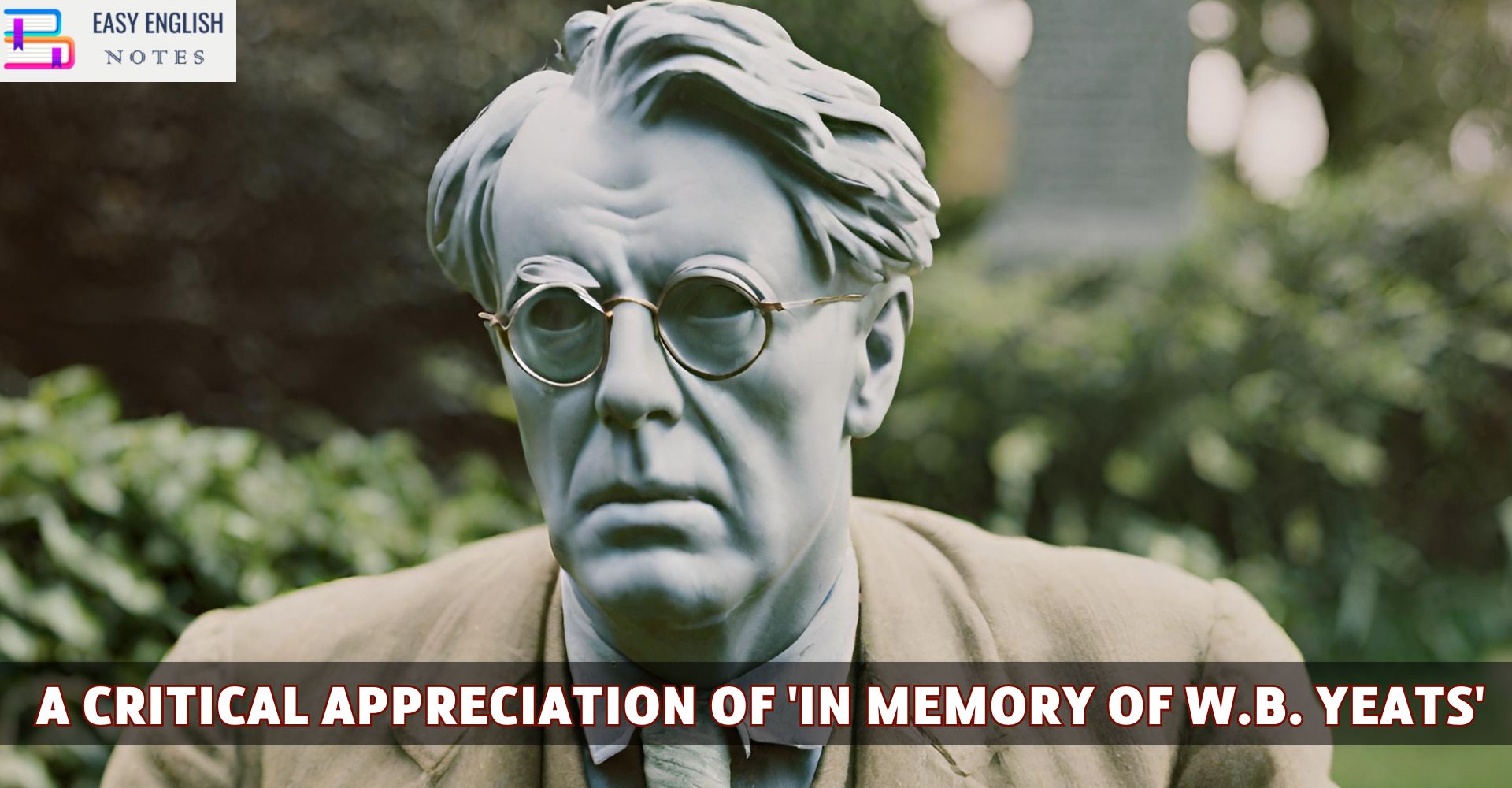In Memory of W.B. Yeats’ appears in Auden’s most topical and discursive volume Another Time written on the death of W.B. Yeats, one of the greatest of Irish poets of the twentieth century. The poem is different from a conventional elegy. In this poems, the treatment of the elegy is ironic. Traditionally, in an elegy all nature is represented as mourning the death, here nature is represented as going on its course indifferent and unaffected. The great Poet’s death goes unnoticed both by man and nature: human life goes on as usual, and so does nature. Secondly. in the traditional elegy the dead is glorified and his death is said to be a great loss for mankind at large. But Auden does not glorify Yeats. He goes to the extent of calling him ‘Silly’, and further that his poetry could make nothing happen. “Ireland has her madness and her weather still.” Thus, Auden treats the theme in his own ironic style. He has reversed the traditional elegiac values.
First of all, Auden refers to the actual day of Yeat’s death-“a dark cold day” in which the fevers and deliriums running through the dying man’s nerves and veins, a kind of false summer, are contrasted with the blockages, the interrupted communications, the distortions of appearance “And snow disfigured the public statues”- created by winter. The poet. a dying emperor, is seen as dissolving into the separate rebellious provinces of his own body. When Auden wrote the poem in 1939 all over Europe some large and complex organism was disappearing, rather “dying at the top.”
So far its imagery, concept and versification is concerned, this poem may be considered modern. In the three sections of the poem, Auden uses different meter arrangement. He shows considerable ingenuity in employing blank verse, iambic lines of unequal length, half-rhymes and feminine endings. The first section was in iambic lines of unequal length, divided into verse blocks of unequal length, not giving the effect of free verse. There are equivalences of feminine ending, like “forests’ and ‘poems” : there are half-rhymes like “rumours’ and ‘admirers’: Yet the total effect is apparently loose and free, a formal and deliberately contrived casualness. One line ends with the carefully chosen, ostentatiously unemotive word unusual’. The blank verse of the second section is very conventional blank verse. The seven syllable lines of the last section seem by contrast to move formally, like a funeral march, with a balance in each line between two major and two minor stresses, the rise and fall of the slow-marching soldiers’ (feet): and with formal movement, the grand last section makes a formal statement.
Also Read :
- Compare Hamlet with Macbeth, Othello and other Tragedies
- “The Pardoner’s Tale” is the finest tale of Chaucer
- Prologue to Canterbury Tales – (Short Ques & Ans)
- Confessional Poetry – Definition & meaning
In this poem, Auden’s elegiac attitude is more realistic than what is usually found in a conventional elegy. Auden suggests that time does not care for what the poets said but for the way they said it. Time will pardon Kipling and his views: it will pardon Claudel for being on the wrong side in the Spanish Civil War. It will pardon Yeats, similarly. for any nonsense he talked. Time ‘worships language’, and for good language time can forgive the faults of the man, such as cowardice, pride, vanity, conceit. etc. All Europe is in the grip of the terror of war and the blood-thirsty leaders of Europe are threatening each other. Nations live in isolation in constant dread of each other, and their hearts are entirely dry of fellow- feeling and sympathy. It is great poetry, or great art alone, that can illumine and transform the human soul, and make the fountain of love and sympathy gush out of it. The poet’s own acceptance of life, and zest for it, alone can fertilize the human soul, and teach it to accept life and rejoice in this great gift of God. Thus art can have a transforming and ennobling influence on the human soul. Thus Auden does not exalt Yeats as a hero or an extraordinary genius, but he stresses the real value and significance of his poetry even in times of crises. Yeats, or any artist for that matter, is not to be worshipped as a man, for all are made of the same common clay. He is to be valued and honoured for the greatness of his art.
Thus, ‘In Memory of W.B. Yeats’ is Auden’s “earnest, direct and manly expression” of his personal feelings. In this as well as in “September. 1. 1939, one cannot feel sure that the speaker is Auden himself. His intimate, personal tone in the poem does not imply direct self-expression of the poet. In fact, in course of his poetic career, Auden had demonstrated impressive facility in speaking through any sort of dramatic persona.
PLEASE HELP ME TO REACH 1000 SUBSCRIBER ON MY COOKING YT CHANNEL (CLICK HERE)











